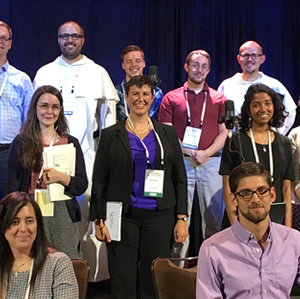
 OUNDS like a clickbait headline, huh? Or…did you even know that there had been a huge Convocation of Catholic Leaders, sponsored by the USCCB and held July 1-4 in Orlando, FL? There was, and it was quite an impressive and faith-filled event (as detailed here, here, and here), with around 150 bishops, 250 priests, 350 religious, and nearly 3,000 lay-faithful in attendance.
OUNDS like a clickbait headline, huh? Or…did you even know that there had been a huge Convocation of Catholic Leaders, sponsored by the USCCB and held July 1-4 in Orlando, FL? There was, and it was quite an impressive and faith-filled event (as detailed here, here, and here), with around 150 bishops, 250 priests, 350 religious, and nearly 3,000 lay-faithful in attendance.
Bishop James Conley spoke of the “beautiful liturgies” at the event, and Kathryn Jean Lopez wrote about the “beautiful music and depths of prayer.” How do you make beautiful, prayerful liturgies in a hotel ballroom?
Credit goes to the publishers of Magnificat, who not only provided a beautiful liturgical booklet covering the whole enterprise, but also oversaw the decoration of the main stage with wonderful floral arrangements. Credit goes, too, to the USCCB itself, which showed images of vibrant medieval stained-glass windows on giant LED monitors, to give the ballroom a taste of majestic cathedrals and visually inspire all those gathered.
But I’d like to draw your attention to the liturgical music. The music was directed by the same team as the music at the Mercy Centre last year at World Youth Day, Kraków — that is to say, Rev. Łukasz Miśko, O.P. and me. There was a choir of sixteen singers, drawn from all over the U.S. (including two O.P. friars from Poland!), as well as an orchestra of seven expert Floridian instrumentalists. And the music was Catholic in the broadest sense, meaning universal:
— We sang Gregorian chant:
Christus resurgens (Gregorian plainsong, mode 8)— We sang Renaissance polyphony:
Quia vidisti me (Estêvão de Brito)— We sang Russian Orthodox chant:
The Beatitudes (Russian Orthodox Chant, arr. Richard Proulx)— We chanted in a Byzantine style:
O Radiant Light (André Gouzes, O.P.)— We sang traditional hymnody in Spanish:
Cantemos al amor (Ignacio Busca de Sagastizábal)— We sang a lovely Mass setting by a contemporary Polish composer:
Sanctus, from Missa Spei (Ursula Rogala)— We sang mystical Eucharistic texts in new musical settings:
Welcome, Bread of Life (Paweł Bębenek)— We even sang a patriotic song toward the end of the 4th of July Mass:
America the beautiful (Samuel A. Ward)
You may be thinking, “Gosh, all that different sort of music. Won’t that induce liturgical whiplash?” But my answer is a resounding “no,” because of what the various pieces all have in common:
— they’re all choral works (even the unison chanting is meant for an ensemble of voices)
— they’re all beautiful pieces appropriate for the liturgy
— they draw from a wide swath of Christian (mostly Catholic) music, reminding us that beauty is not limited to a certain era or style
— and they were sung by a choir of devoted and faithful Catholics, who were praying through their song.
The music was very well-received, by everyone from bishops and priests to consecrated religious, lay faithful, people from a wide variety of ethnicities and backgrounds. Beauty opens hearts and inspires souls.
We encourage this authentically Catholic approach to music: if it can help people to pray, sing it!
*******
To see complete listings of the Mass music, click here.
To learn more about the Dominican Liturgical Center, the driving force behind this liturgical approach, click here.
